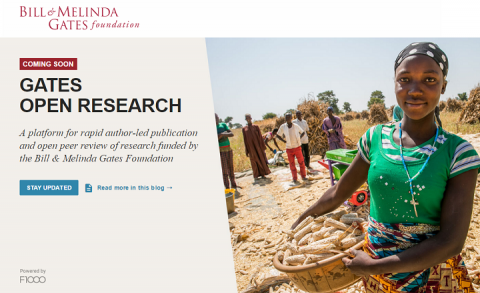Informed consent in trials of genetically modified mosquitoes – an author and reviewer in conversation – Part 2
| 16 March, 2018 | Shane Canning |
|

|
The second post on discussion between a Gates Open Research author and reviewer

Image credit: Karunakar Rayker/Flickr CC BY 20
An Open Letter published by Pamela Kolopack, University of Toronto and James Lavery, Emory University, on Gates Open Research discussed issues around informed consent in field trials of genetically modified mosquitoes. The article was openly peer reviewed by Carolyn Neuhaus, The Hastings Centre, after publication. Last week we published the first part of this post in which James (JL) and Carolyn (CN) discussed topics raised in James’ article. This week they discuss open peer review, institutional review boards and mechanism of authorisation.
This article on Gates Open Research underwent open peer review, why do you think as a reviewer and an author, respectively, it is important to have such discussions in a transparent way?
 CN: The open peer review model exemplifies that academic publishing is dialogical. Writing peer reviews or commentaries to articles, and responding to peer reviews or commentaries, is a conversation among authors. The conversation is usually slow – sometimes over many years, not transparent – anonymous peer review means that authors cannot know with whom they are in conversation – and must conform to certain disciplinary standards.
CN: The open peer review model exemplifies that academic publishing is dialogical. Writing peer reviews or commentaries to articles, and responding to peer reviews or commentaries, is a conversation among authors. The conversation is usually slow – sometimes over many years, not transparent – anonymous peer review means that authors cannot know with whom they are in conversation – and must conform to certain disciplinary standards.
Traditional academic publishing is an effective, if not particularly efficient, way to achieve civil discourse about complicated and sometimes divisive ideas. The Gates Open Research model still conforms to disciplinary standards, and achieves a civil discourse about ideas, but the conversation is faster and all discussants are known to each other. There may be several benefits to this model, among them deepening the extent to which discussants invest in the conversation, allowing researchers to quickly correct course in response to reviewers’ comments, and facilitating follow up conversations between authors and reviewers to clarify or further challenge ideas. I’ve really enjoyed this process and hope to see more opportunities for open peer review in the future.
 JL: The idea of peer review as a conversation resonates strongly with me, but the reality very often disappoints. A main function of peer review is to point out gaps and weaknesses, and in many cases the process fulfils this function, but feels punitive. One thing that has been consistent through the experience with the open review of this article is how thoughtful and constructive the comments have been. All of the reviewers have pointed out gaps and weaknesses—as they should—but they have done so with sound rationales and with careful attention to how their observations might strengthen the core points that we offered. This motivates us, as the authors, to refine and improve our thinking. And the ability to engage in this dialogue without having to wait for months or years for the peer review process to ripen is invaluable.
JL: The idea of peer review as a conversation resonates strongly with me, but the reality very often disappoints. A main function of peer review is to point out gaps and weaknesses, and in many cases the process fulfils this function, but feels punitive. One thing that has been consistent through the experience with the open review of this article is how thoughtful and constructive the comments have been. All of the reviewers have pointed out gaps and weaknesses—as they should—but they have done so with sound rationales and with careful attention to how their observations might strengthen the core points that we offered. This motivates us, as the authors, to refine and improve our thinking. And the ability to engage in this dialogue without having to wait for months or years for the peer review process to ripen is invaluable.
The article discusses the challenges that will be faced by institutional review boards (IRBs) when considering this type of field trial. What do you think the main points that board members should consider when deciding on whether to waive or modify informed consent requirements for such a trial?
JL: One of our goals, in writing our article, was to make the point that only a minority of individuals who have interests in the conduct and outcomes of the trials are likely to be research subjects, according to the criteria of the regulations, and only under quite predictable and narrow circumstances. It is in these circumstances, and only in these circumstances, that the regulatory requirement of informed consent should apply.
“The idea of waiver or modification is ultimately driven by assessments of the nature and likelihood of the risks involved” James Lavery
As Carolyn very nicely lays out in her comment on question 2 in the previous post, there will be disagreements among IRBs about when these conditions have been met. The idea of waiver or modification is ultimately driven by assessments of the nature and likelihood of the risks involved. One of the main complicating features of trials that go beyond the normal individual research subject paradigm, is that there are likely to be stakeholders who stand to have their interests set back in various ways, i.e., who stand to be harmed, by the conduct and/or outcomes of the trial, but who fall outside the scope of the regulatory definition of human subject. And many of these interests will be non-obvious to IRBs, especially when they are remote from the study sites.
While waiving informed consent may be entirely appropriate, for reasons described above, it is equally true that IRBs are likely to miss, or dismiss, other risks for non-subjects even though these risks might be created by the research and might entail some jeopardy for the IRB’s institution. It is precisely this gap that provides one of the strongest ethical grounds for community and stakeholder engagement, which, again, currently lies beyond the scope of the Common Rule.
“Just because someone is not a subject of research does not mean that they will not be harmed by the research in various ways” Carolyn Neuhaus
CN: Jim’s last point is very important: waiving informed consent is appropriate in many cases of research on insects or animals in the wild, yet this provides one of the strongest rationales for community and stakeholder engagement. Just because someone is not a subject of research does not mean that they will not be harmed by the research in various ways. For example, as Jim noted in his response to Question 2 in the previous post, property values in the area might go down.
I’m not 100% sure that IRBs are the best forums to consider and assess these risks, though, in part because, as Jim notes, many of these risks will be non-obvious to IRBs. Community engagement activities could provide an alternative forum to consider a variety of interests, assess how those interests may be affected by the proposed trial, and come up with ways to protect and respect the interests of affected persons, including the possibility of abandoning a trial.
Some comments by reviewers asked if there are a number qualifications about when informed consent might act as a mechanism of authorisation, but would not be an ethical requirement. What are your thoughts on this?
JL: I think this question is answered by the construction of the policy itself. The “protections” provided by the Common Rule, including informed consent, represent specific procedures that the institution can use to minimize the risk of harm to research participants that might arise in research conducted under the auspices of the institution.
“The Common Rule is a procedural policy of institutional accountability, rather than a substantive ethical policy” James Lavery
The Common Rule is a procedural policy of institutional accountability, rather than a substantive ethical policy, but informed consent is generally considered to be a concrete way of demonstrating respect for persons who have agreed to participate in research. So, if informed consent is required because someone is considered to be a human research participant, and the IRB has decided that the level of risk under consideration warrants informed consent as a regulatory protection, then this is an example of a mandatory requirement of institutional accountability that enacts a deeper ethical commitment of respect. But if a researcher asks a home resident for permission to enter her property to release mosquitoes, for example, and if no other conditions are met that would render the person a research subject, then informed consent would not be required, but it would be a mistake to say that the request for permission was not an ethical requirement.
The ethics are simply governed by different conventions. In both cases the request for permission is a gesture of respect, and in both conditions, failure to offer the gesture of respect can result in sanctions—by the Office for Human Research Protections on the one hand, and by the local police, potentially on the other.
CN: I think this question might have it backwards. Informed consent – in the sense it is defined in the Common Rule – may not be required as a legal mechanism of authorization to proceed with this kind of research, but the ethical principle of respect for persons would still require that people who are affected by the research in some sense agree to it. The rub is in figuring out how to operationalize respect for non-subjects.
“The requirement that researchers obtain informed consent from human research subjects is rooted in respect for persons.” Carolyn Neuhaus
Obtaining informed consent is a very effective way of eliciting and documenting individual agreement to research participation. As Jim says, the requirement that researchers obtain informed consent from human research subjects is rooted in respect for persons. But when the Common Rule doesn’t apply, we do not abandon respect for persons. We must come up with other mechanisms of authorization, other ways of operationalizing respect for persons. For example, asking permission to access private property is rooted in respect for persons. Community engagement and authorization of research has been proposed as an alternative to informed consent in part because it engenders respect for people who are variably affected by research and ought to decide, collectively, whether to go ahead with a proposed experiment.
Gates Open Research provides all Gates Foundation-funded researchers with a place to rapidly publish any results they think are worth sharing. All articles benefit from immediate publication, transparent refereeing and the inclusion of all source data. If you are a grantee of the Gates Foundation you can find more information about how to publish on Gates Open Research here.

|




User comments must be in English, comprehensible and relevant to the post under discussion. We reserve the right to remove any comments that we consider to be inappropriate, offensive or otherwise in breach of the User Comment Terms and Conditions. Commenters must not use a comment for personal attacks.
Click here to post comment and indicate that you accept the Commenting Terms and Conditions.